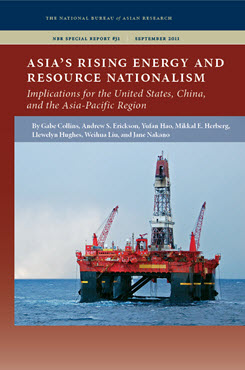Asia's National Oil Companies and the Competitive Landscape of the International Oil Industry
This essay analyzes the impact of Asia’s national oil companies (NOC) on the competitive
landscape of the global oil industry and draws implications for the U.S.
EXECUTIVE SUMMARY
This essay analyzes the impact of Asia’s national oil companies (NOC) on the competitive landscape of the global oil industry and draws implications for the U.S.
MAIN ARGUMENT
The expansion of Asia’s NOCs has been driven by both energy security concerns and the commercial drive to exploit new opportunities. Since 2006, Chinese and other Asian NOCs have become increasingly competitive with international oil companies (IOC) in many of the most important oil- and gas-producing regions. The IOCs still have strong competitive advantages, but they increasingly find themselves squeezed out of major new opportunities by resource nationalism among producing and exporting countries and global competition from NOCs. In Asia, some IOCs are responding by forging new partnerships with China’s and India’s NOCs, trading access to their international resource opportunities in return for risk capital or access to Chinese and Indian markets.
POLICY IMPLICATIONS
- The rapid expansion of Asia’s NOCs is not the threat to U.S. energy security that some in Washington, particularly in Congress, think it is. Chinese and other Asian NOCs’ efforts to acquire equity oil are not “locking up” oil supplies and undermining U.S. energy security. The common challenges and energy security threats that the U.S. and Asia face are restricted access and underinvestment in new supplies.
- Perceptions that Chinese NOCs are agents of Beijing’s strategic agenda and a challenge to U.S. interests are also misguided. China’s NOCs have a wide range of control over their investments and strategy and largely operate along the same lines as IOCs.
- Heavy state support from Beijing does potentially threaten the ability of U.S.-based oil companies to compete for new opportunities. The U.S. has a strong national interest in the existence of strong IOCs, and U.S. policymakers should press Beijing explicitly and firmly to reduce state support.


